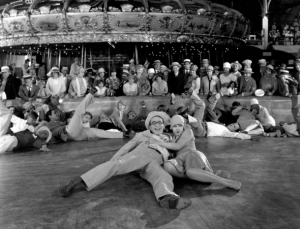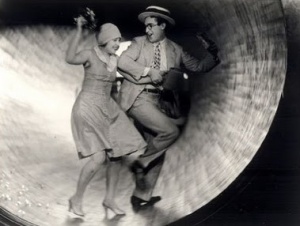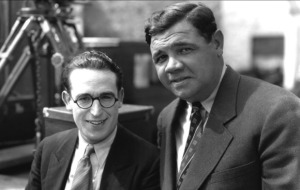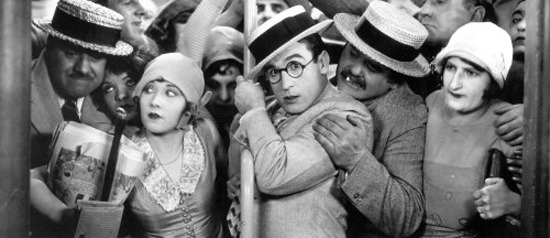★★★★
Today, Harold Lloyd is generally considered to be the third greatest silent comedian of all time (behind Charlie Chaplin of Buster Keaton, of course), yet still, many of his films are unseen by anyone except his already devoted followers. Perhaps it’s because the rights to his numerous films have kept them out of the public eye more so than his contemporaries.  Thanks, however, to recent efforts, his films are once again emerging through a series of DVD’s (The Harold Lloyd Comedy Collection), as well as The Criterion Collection, who recently inducted Lloyd’s most famous film, “Safety Last” (1923) into their ranks of great movies. There are also a few films that Criterion has made available on Hulu, one of which is the last of his silent comedies, “Speedy” (1928).
Thanks, however, to recent efforts, his films are once again emerging through a series of DVD’s (The Harold Lloyd Comedy Collection), as well as The Criterion Collection, who recently inducted Lloyd’s most famous film, “Safety Last” (1923) into their ranks of great movies. There are also a few films that Criterion has made available on Hulu, one of which is the last of his silent comedies, “Speedy” (1928).
Like many Lloyd pictures, the story itself is very basic. He plays Harold “Speedy” Swift, a good natured man trying to find a decent job in order to marry his sweetheart, Jane (Ann Christy). She lives with her father, Pop (Bert Woodruff), who drives the last horse-drawn trolley in New York City. A big businessman is trying to buy him out, in order to make way for a more modern system, but while Pop is writing up his “rock bottom price,” Speedy changes the paper to read $70,000 instead of $10,000. Speedy is aware that in order to control the roadways, Pop will have to be bought out, and any price could be asked. What Speedy doesn’t stop to consider is that when the businessman is outraged by the price, he turns to deceitful and even violent measures to gain control of Pop’s trolley and track.
Of course this story is just a small fraction of the film, as most scenes are really just a series of comedy sketches strung together, in which Speedy attempts (and fails) at several odd jobs- ice cream scooper, taxi driver and eventually the driver of Pop’s trolley.  There is also a hilarious section of the film where Speedy takes Jane to Coney Island for an eventful day of fun. Coney Island serves as the perfect location for quick laughs with the various rides, games and foods, all of which seem to be more than Lloyd can handle. Not to mention the wandering dog, who does everything possible to cause trouble for him.
There is also a hilarious section of the film where Speedy takes Jane to Coney Island for an eventful day of fun. Coney Island serves as the perfect location for quick laughs with the various rides, games and foods, all of which seem to be more than Lloyd can handle. Not to mention the wandering dog, who does everything possible to cause trouble for him.
What you take for granted in “Speedy” is the ease with which Lloyd keeps things funny. His comedy style is effortless, making each scene just as enjoyable as the last. By this point in the history of film, there were very few things that hadn’t been done in a silent comedy, yet Lloyd’s jokes and stunts don’t feel old or tired. He might be doing recycled sketches, but he has reinvented them with his own unique approach, giving the film a fresh feel.
As a special bonus in this movie, New York Yankee legend Babe Ruth makes an appearance as one of Lloyd’s cab fares, and does a fantastic job looking nervous on the high-speed trip to Yankee Stadium. Although, it’s nothing that’s going to win him any acting awards, it sure is fun to have him there, combining one of the greatest sports icons with one of the greatest comedians of the time (or any time for that matter).
What is most interesting about this film today is the comparisons between the earlier, fading days of New York, and the up and coming “modern” ones. The last horse-drawn trolley is amazing to see, patrolling the roads in its final days in the big city, and although we rejoice with Pop when he finally wins out against the “buisnessmen,” there is something sad about knowing what relinquishing his trolley would mean in the long run. Certainly we have to expect and make way for progress, but it still can be sad to watch happen.  When Pop is driving his trolley up and down the streets of his neighborhood, everyone waves and smiles. Heck, he allows the old-time Civil War veterans to play cards in his trolley during the night. As soon as his horse-drawn is replaced with an electric, fast-moving machine, the personal touch that Pop has added to the neighborhood over the years will forever be lost.
When Pop is driving his trolley up and down the streets of his neighborhood, everyone waves and smiles. Heck, he allows the old-time Civil War veterans to play cards in his trolley during the night. As soon as his horse-drawn is replaced with an electric, fast-moving machine, the personal touch that Pop has added to the neighborhood over the years will forever be lost.
I know it’s an uphill, backwards battle to try to fight for the “old” way of doing things, but I think this discussion is relevant here since this was in fact the final silent comedy of Lloyd’s career. Sure you have to look at the progress that was happening around Lloyd at the time that he made “Speedy,” but knowing what he would give up by moving to the talking pictures is sad and depressing. Besides, how many talking Harold Lloyd movies do you love?
http://rcm-na.amazon-adsystem.com/e/cm?t=lasthemov-20&o=1&p=8&l=as1&asins=B000B5XOS4&ref=tf_til&fc1=000000&IS2=1<1=_blank&m=amazon&lc1=0000FF&bc1=E3E3E3&bg1=E3E3E3&f=ifr


“Speedy” is such fun and for so many different reasons. Historical perspective is one, but so is the gang of seniors who rush into the fray. When I was young there was a series on PBS devoted to Lloyd’s comedies. It had a peppy little theme song that went “Hooray for Harold Lloyd. Tee-da-da-da-tee-tee-ta-ta-ta. Harold Lloyd! Tee-da-da-da-tee-tee-ta-ta-ta.” You’d think it would be annoying, but to me it heralded good times.
The next time you’re talking to any film historians remind that Caftan Woman says the order is STAN … then Keaton, Lloyd & Chaplin.
LikeLike
I certainly will pass on your order… at least I would if any film historians would take me calls.
The PBS series sounds fantastic. I would love to experience something like that- even with the theme song!
LikeLike
Hooray for Harold Lloyd! I haven’t seen this one but I am looking forward to it. Harold is adorable and sooo entertaining.
LikeLike
“Speedy” is certainly a film worth seeing and clearly shows Lloyd’s overall talents. Great comedy = great fun.
LikeLike